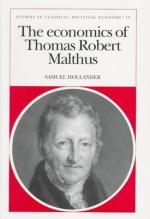|
This section contains 162 words (approx. 1 page at 300 words per page) |
Thomas Robert Malthus is best remembered for his 1798 treatise titled An Essay on the Principle of Population as it Affects the Future Improvement of Society.
 Thomas Robert Malthus. (Corbis-Bettmann. Reproduced by permission.)
Thomas Robert Malthus. (Corbis-Bettmann. Reproduced by permission.)
Internet Resource
The International Society of Malthus Web site, edited by Ronald Bleier. Available from http://www.igc.org/desip/malthus.
|
This section contains 162 words (approx. 1 page at 300 words per page) |


